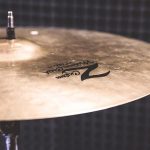
It is amazing how often maintenance can be overlooked in music, we just want to play our instruments, not take care of them! Cleaning your cymbals is really important for a few reasons, but it doesn’t have to be tough. We explore how to clean cymbals to keep your drums looking (and sounding) in top condition.
Why Clean Cymbals?
Many people wrongly assume that cleaning cymbals is purely for looks. While it is true that after a while, cymbals can start to look grubby, the dirt and oxidized metal (rust, effectively) which has collected on the top of the cymbal can lead to the sound becoming much less bright. The ring and crispness of your cymbal can disappear. If you are looking for more of a trashy, lo-fi or punky sound, experimenting with dirty cymbals can be interesting, and some even like the sound. For most drummers though, cleaning cymbals periodically is essential.
Cymbal Cleaning Method
The actual methodology behind cleaning your cymbals is very simple. It is a bit like washing the dishes, only the dishes are very fragile and made of metal!
- Place the cymbals in luke-warm water with a cymbal cleaner or polish. This should be a recognized brand of cymbal cleaner. Some people use other products which can damage your cymbals. Follow the manufacturer’s instructions for how much to put in.
- With a very soft cloth or specific non-abrasive metal cleaner, wipe away any clear areas of oxidization and dirt. Leave the cymbal to soak in the water for a minute or two, this will help loosen areas of dirt.
- Place the cymbal on an old unwanted towel or cloth (it will probably get dirty)
- With a rag or soft cloth, apply cymbal polish. Repeat as needed until the cymbal starts to appear clean and shiny.
- Rinse the cymbal with warm (not scalding hot) water. Make sure you do this thoroughly, ensure all polish and dirt has been cleaned away and you are left with a cymbal looking as good as new!
The Cleaning Product Myths
If you’re looking up how to clean Zildjian cymbals or Paiste cymbals, or pretty much any brand, don’t be duped by the people saying you can do so with lemon juice. There are many wives tales out there telling you that washing-up liquid will do just as good a job. It isn’t true.
Common claims are that cymbals can be cleaned with ketchup and with lemon juice.
Most cymbals are made with quite a complex mixture of metals. If you have spent a lot of money on a branded cymbal, it makes sense that you would take care of it and the best way to do this is to use a specific cleaning product offered for your drums. Most brands offer their own branded cleaner, and this is the best way to ensure that you won’t damage your cymbals.
Lemon Juice and Fairy Liquid will only get you so far, and if you use the wrong cleaner you can end up damaging your kit.
Finding The Best Cymbal Polish and Cleaner for Your Kit
Brand Specific Cleaners
This should always be your preference. If you have bought a cymbal from Zildjian or Paiste or Sabian, you may well get a small bottle of cleaner or polish with it. This is the best bet when it comes to your own cymbal. If you didn’t get a product free with it, rest assured that the top brands offer their own cleaners which can easily be purchased online. They will also have instructions for which of their cymbals the products are suitable for. For instance, this Zildjian cymbal cleaner is designed for their ‘brilliant finish’ models.
An alternative to the brand specific cleaners is a brilliant little product called ‘groove juice’. This is a product which simply sprays onto your cymbals and then rinses off, doing a good job of cleaning them in the process. Groove juice is suitable for use with most types of cymbal, and a quick look at their reviews online shows us that the majority who have used them seem to be pretty happy with their purchase. If you have a lot of different brands of cymbals and don’t want to buy each their individual cleaner, or if you don’t have the most expensive cymbals, Groove Juice will do a good job of being a versatile cleaner.
If you are looking for a product which can be bought on pretty much any high-street, then at a push, you could consider using brasso to clean your Cymbals. This can have some negative effects on the finish of your drums, so if you can avoid it, I would say to do so. However, if you are using fairly cheap or worn cymbals anyway, using brasso is far better than using products which aren’t specifically made for metal.
Maintenance and Avoiding Damage
The top ways to avoid damage to your cymbals are really quite simple. A lot of musicians are guilty of spending lots on equipment and then not taking the necessary care of them.
- Don’t fall for those who try to sell you a story about cleaning them with other products. Metal-specific cleaners are the only suitable product.
- Be very careful about what material you are using. All rags, cloths, and sponges used to come into contact with your drums should not be able to scratch them. Microfibre or even velour products are preferred. The MoozikPro gets my vote for the safest cloth to use to touch your cymbals.
- Take good care of your cymbals. They’re pretty hard-wearing and if you take good care of them they can last years or even decades. If you’re having to wash your cymbals every week it may start to take its toll. Cover your drums when you’re not playing them, and if you transport your drums a lot, consider a cymbal bag to keep your drums from being damaged.
Further Watching:
Check out the following video, made by Zildjian and available on their YouTube.
When the top brands are making their own videos showing you how to clean their cymbals, you know they will be trustworthy!
Conclusion
We know you want to be headlining a festival, not cleaning your cymbals. This isn’t the reason any of us became a drummer, but the good news is if you use the right products it doesn’t have to be too much of a chore, and it certainly isn’t too time-consuming. Cleaning and polishing your drums has merit not just for looks, but for keeping the sound of your drums crisp, and therefore should not be ignored.






